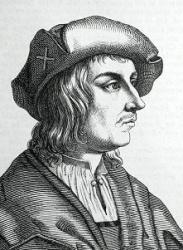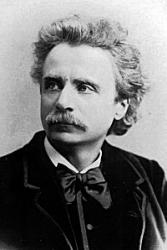Planning worship?
Check out our sister site, ZeteoSearch.org,
for 20+ additional resources related to your search.
- |
User Links
Person Results
Lazarus Spengler

1479 - 1534 Person Name: Lazarus Spengler (1479-1534) Topics: The Holy Scriptures Fall, Depravity, Guilt of Man Cento of "All Mankind Fell in Adam's Fall" in The Christian Hymnary. Bks. 1-4 Spengler, Lazarus, was the 9th of the 21 children of Georg Spengler and Agnes his wife, and was born March 13,1479, at Nürnberg, where his father was clerk of the Imperial court of Justice (Landgerichtschreiber). He entered the University of Leipzig in 1494; but on the death of his father on Dec. 27, 1496, he returned to Nürnberg, obtained a position in the town clerk's office, in 1507 became himself town clerk (Raths Syndikus), and in 1516 also Rathsherr. When Luther was passing through Nürnberg, in 1518, on his way to Augsburg, Spengler made his acquaintance. He warmly espoused the Reformation doctrines, published in 1519 his Schutzre in Luther's favour, and himself became one of the leaders in the Reformation work at Nürnberg. He was one of those condemned by name in the Bull of Excommunication launched by Pope Leo the Tenth, on June 15, 1520, against Luther and his friends. Dr. Eck sent the Bull to the Town Council of Nürnberg, and urged them to proceed against Spengler, but they ignored it, and then sent him as one of their representatives to the Diet of Worms, in April 1521. In 1525 Spengler went to Wittenberg to consult with Luther and Melanchthon as to turning the Benedictine Aegidienstift (Schottenkloster) into an Evangelical Gymnasium, and this was opened as such by Melanchthon on May 23, 1526. Spengler was also the prime mover to the Visitation of 1528, and upheld strict Lutheranism in the negotiations at the Diet of Augsburg in 1530. He died at Nürnberg, Sept. 7, 1534 (Koch, i, 308 ; Will's Nürnbergisches Gelehrten-Lexikon, iii., p. 731; Herzog's Real-Encyklopädie, xiv., 516).
Spengler was a trusty friend and valued counsellor of Luther and the principal Reformers of Germany. He also interested himself in the improvement of the church services, and in 1532 was able to have an authorised Liturgy (Kirchenordnung) printed. He wrote a considerable quantity of verse, sacred and secular ; but only two hymns are ascribed to him.
The one is an indifferent version of Ps. cxxvii., beginning "Vergebens ist all Müh und Kost." The other is:—
Durch Adams Fall ist ganz verderbt. Fall and Redemption. First published in the Geystliche Gesangk Buchleyn, Wittenberg, 1524, and thence in Wackernagel, iii. p. 48, in 9 stanzas of 10 lines…During the Reformation period it attained a wide popularity as a didactic and confessional hymn of the Evangelical faith. It is one of the most characteristic hymns of the time, conceived in the spirit of deep and earnest piety, eminently Scriptural, and setting forth the Reformation teachings in concise and antithetical form, but is however too much like a system of theology in rhyme.
The translations are:—- 1. "By Adam's fall was so forlorne." By Bishop Coverdale, 1539, reprinted in his Remains, 1846, p. 556. 2. "When Adam fell our total Frame." By J. C. Jacobi in his Psalmodia Germanica, pt. ii., 1725, p. 17. [Rev. James Mearns, M.A.]
--Excerpts from John Julian, Dictionary of Hymnology (1907)
Lazarus Spengler
David Hadden
Topics: The Church of Jesus Christ The Scriptures Author of "For unto us a child is born" in Complete Mission Praise
David Hadden
Edgar L. Maxwell
1878 - 1940 Person Name: Edgar L. Maxwell (1878-1940) Topics: The Holy Scripture Vers. esp. of "Dadme la Biblia" in Himnario Adventista del Séptimo Día
Edgar L. Maxwell
George Burder

1752 - 1832 Topics: The Holy Scriptures Composer of "" in Hymnal Burder, George, born in London, June 5, 1752, and trained as an engraver. At the age of 24 he commenced preaching with the Calvinist Methodists, but subsequently joined the Congregationalists,and was pastor sucessively at Lancaster, Coventry, and Fetter Lane, London. He was one of the active founders of the Religious Tract, the London Missionary, and the British and Foreign Bible Societies, and some time editor of the Evangelical Magazine. He died May 29, 1832. His works include Village Sermons, 1704; Sea Sermons, 1821; Cottage Sermons, 1826, and others. He is known to hymnology by his Collection of Hymns from various Authors, intended as a Supplement to Dr. Watts, &c, 1784. (Preface dated Nov. 20, 1784.) It had attained to the 25th edition in 1827. To this collection he contributed 4 hymns, the best known being, "Sweet the time, exceeding sweet" (q.v.), sometimes altered to "Great the joy when Christians meet." The remaining three, all from the 1st edition 1784, are:—
1. Come, dear Desire of nations, come. Missions.
2. Come ye that know and fear the Lord. Love of God. In Dr. Hatfield's Church H. Bk., N.Y., 1872, 5 st. out of 9 are given as No. 236.
3. Lord, solemnize our trifling minds. Before Sermon. Altered to "Great God, impress our trifling minds," in the New Congregational Hymn Book, No. 786, &c.
Burder's Collection is of importance in the history of Congregational hymnody. The 1st edition, 1784, contained 187 hymns; 2nd edition, 1784, 211; 9th edition, 1803, 257 hymns; 18th edition, 1820, 277; and the last, the 25th edition, 1827, 294. His son, Henry Foster Burder, published a Collection of Ps. & Hymns, 1826; and another son, the Rev. John Burder, also compiled a Collection published without date. To the 18th edition, 1820, of G. Burder's Collection, the wife of his son H. F. Burder contributed "And will the God Who reigns on high " (Sunday Schools), under the signature “S. M. Burder" [Sophia Maria].
-- John Julian, Dictionary of Hymnology (1907)
George Burder
Edvard Grieg

1843 - 1907 Person Name: Edvard Grieg, 1843-1907 Topics: God's Word The Holy Scriptures Composer of "GRIEG" in Trinity Hymnal (Rev. ed.) Edvard Hagerup Grieg Born at Bergen, Norway, of Scottish descent, son of a merchant and vice-consul in Bergen, his mother was a music teacher. He became a pianist and composer, with his standard classical repertoire known worldwide. He developed Norwegian folk music into his own compositions, helping to develop a national musical identity. As a child his mother taught him piano from age six. He attended several schools. His uncle, a Norwegian violinist, recognized his nephew’s talents at age 15 and urged his parents to send him to the Leigzig Conservatory in Germany. He enrolled there and concentrated on piano. He enjoyed the many concerts and recitals given in Leipzig. He disliked the discipline of the conservatory course of study, but he loved the organ, mandatory for piano students. In 1860 he survived a life-threatening lung disease, pleurisy and tuberculosis. Throughout life, his health was impaired by a destroyed left lung and disformity of his thoracic spine. He suffered numerous respiratory infections, and ultimately developed combined heart and lung failure. He was admitted many times for various spas and sanatoria in both Norway and abroad. Several of his doctors became close friends. In 1861 he made his debut as a concert pianist at Karlshamm, Sweden. He finished Leipzig studies in 1862 and held a concert in his hometown, playing Beethoven’s ‘Pathetique’ sonata. In 1863 he went to Copenhagen, Denmark, remaining there three years. There he met Danish composers and a fellow Norwegian composer, Rikard Nordraak, who wrote the Norwegian National Anthem. When Nordraak died in 1866, Grieg composed a funeral march in his honor. In 1867 Grieg married his first cousin, Nina Hagerup. Their only child, Alexandra, was born the following year. She died from meningitis at age two. In 1868 he wrote his Piano Concerto in A-minor. It was performed by Edmund Nuepert in Copenhagen because Grieg was in Norway at the time, fulfilling other commitments. In 1868 Franz Liszt, not yet having met Grieg, wrote a testimonial of him, resulting in Grieg’s obtaining a travel grant. The two met in Rome in 1870. Each was impressed with the other’s musical accomplishments. Grieg had close ties with the Bergen Philharmonic Orchestra and became its leader 1880-1882. In 1888 Grieg met Tchaikovsky in Leipzig. He was struck by Tchaikovsky’s sadness. Tchaikovsky praised Grieg’s music. The Norwegian government awarded Grieg a pension. In 1903 he made gramophone recordings of his piano music in Paris, France. He also made live piano music rolls for the Hupfeld Phonola piano-player system and Weldt-Mignon reproducing system. He also worked with the Aeolian Company for its ‘Autograph Metro-style’ piano roll series, wherein he indicated the tempo mapping of many of his pieces. In 1906 he met pianist and composer, Percy Grainger, in London. Grainger was an admire of Grieg’s music, and they developed a strong empathy for each other. Grieg wrote of Grainger: “I have written Norwegian dances that no one in my country can play, and here comes this Australian who plays them as they ought to be played. He is a genius that we Scandinavians cannot do other than love.” Grieg and his wife considered themselves Unitarians, and attended that church denomination. When Grieg died after a long illness, at age 64, his funeral drew more than 30,000 people in his hometown, who came out to honor him. His own funeral march, in honor of Nordraak, was played, along with a 2nd march, by his friend, Johan Halvorsen, who married Grieg’s niece. Grieg was cremated, with ashes entombed in a mountain crypt. Later, his wife’s were placed with his.
John Perry
Edvard Grieg
Paul Leddington Wright
b. 1951 Person Name: Paul Leddington Wright, b. 1951 Topics: The Holy Scriptures Arranger of "[Speak, O Lord as we come to you]" in Singing the Faith
Paul Leddington Wright
C. W. Poole
1828 - 1924 Person Name: Clement William Poole (1828-1924) Topics: The Holy Scriptures; Holy Scriptures; Scriptures, The Composer of "PETERSHAM" in The Hymnal
C. W. Poole
Charles E. Watson
1869 - 1942 Topics: The Scriptures; Scriptures Author of "The Lord Almighty Spoke the Word" in Moravian Book of Worship
Charles E. Watson
H. S. Cutler

1825 - 1902 Person Name: H. S. Cuther, Mus. Doc. Topics: The Holy Scriptures Composer of "[Come, pure hearts, in sweetest measures]" in The Hymnal, Revised and Enlarged, as adopted by the General Convention of the Protestant Episcopal Church in the United States of America in the year of our Lord 1892 Henry Stephen Cutler (b. Boston, MA, 1824; d. Boston, 1902) studied music in Frankfurt, Germany, in 1844. He moved to England, where he listened with interest to the cathedral choirs and came under the influence of the Oxford Movement. Returning to Boston in 1846, Cutler became organist of the Episcopal Church of the Advent and formed a choir of men and boys, to whom he introduced the wearing of liturgical robes. When he took a position at Trinity Church in New York City, he removed women from the choir and used the occasion of a visit by the Prince of Wales to the church to introduce his newly vested men and boys' choir. He also moved the choir from the gallery to the chancel and initiated the chanting of the psalms and the singing of part of the worship service. Cutler compiled The Psalter, with Chants (1858) and published The Trinity Psalter (1864) and Trinity Anthems (1865).
Bert Polman
H. S. Cutler
Charles Steggall
1826 - 1905 Person Name: Charles Steggall, 1826-1905 Topics: Scripture Composer of "DAY OF PRAISE" in Together in Song
Charles Steggall


 My Starred Hymns
My Starred Hymns

